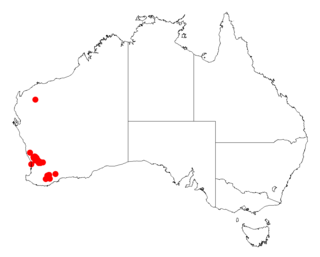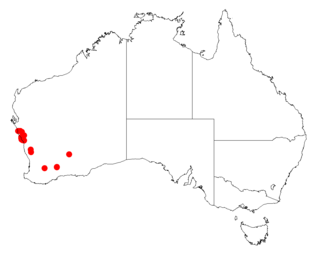
Acacia translucens, commonly known as poverty bush, is a shrub that is endemic to a large area of north western Australia.

Acacia holosericea is a shrub native to tropical and inland northern Australia. It is commonly known as soapbush wattle, soapbush, strap wattle, candelabra wattle, silver wattle and silky wattle.

Acacia leptocarpa, commonly known as north coast wattle, is a shrub or small tree native to New Guinea and coastal regions of northern Australia.

Acacia filamentosa is a shrub belonging to the genus Acacia and the subgenus Juliflorae that is endemic to north western Australia.

Acacia filifolia is a shrub belonging to the genus Acacia and the subgenus Juliflorae that is endemic to western Australia.

Acacia gloeotricha is a shrub belonging to the genus Acacia and the subgenus Juliflorae that is endemic to north western Australia.

Acacia oncinocarpa is a shrub or tree belonging to the genus Acacia and the subgenus Juliflorae that is endemic to northern Australia.

Acacia wickhamii is a shrub belonging to the genus Acacia and the subgenus Juliflorae that is endemic to parts of northern Australia.

Acacia capillaris is a shrub belonging to the genus Acacia and the subgenus Lycopodiifoliae that is endemic to small area in north western Australia.

Acacia barbinervis is a shrub belonging to the genus Acacia and the subgenus Phyllodineae endemic to Western Australia.

Acacia crassistipula is a shrub belonging to the genus Acacia and the subgenus Phyllodineae that is endemic to western Australia.
Acacia erioclada is a shrub belonging to the genus Acacia and the subgenus Phyllodineae native to Western Australia.

Acacia iteaphylla, commonly known as Flinders Range wattle, Port Lincoln wattle, winter wattle and willow-leaved wattle, is a shrub belonging to the genus Acacia and the subgenus Phyllodineae that is endemic to South Australia.

Acacia leptospermoides is a shrub belonging to the genus Acacia and the subgenus Phyllodineae and is endemic to a large area of south western Australia.

Acacia oxyclada is a shrub belonging to the genus Acacia and the subgenus Phyllodineae that is endemic to western Australia.

Acacia sphacelata is a shrub of the genus Acacia and the subgenus Phyllodineae that is endemic to south western Australia.

Acacia spinosissima is a shrub of the genus Acacia and the subgenus Phyllodineae native to south western Australia.

Acacia colletioides, commonly known as wait-a-while, pin bush and spine bush, is a shrub of the genus Acacia and the subgenus Plurinerves that is native to Australia.

Acacia multisiliqua is a shrub or tree of the genus Acacia and the subgenus Plurinerves that is endemic to northern Australia.

Acacia stipulosa is a shrub of the genus Acacia and the subgenus Plurinerves that is endemic to the area of northern Australia.




















